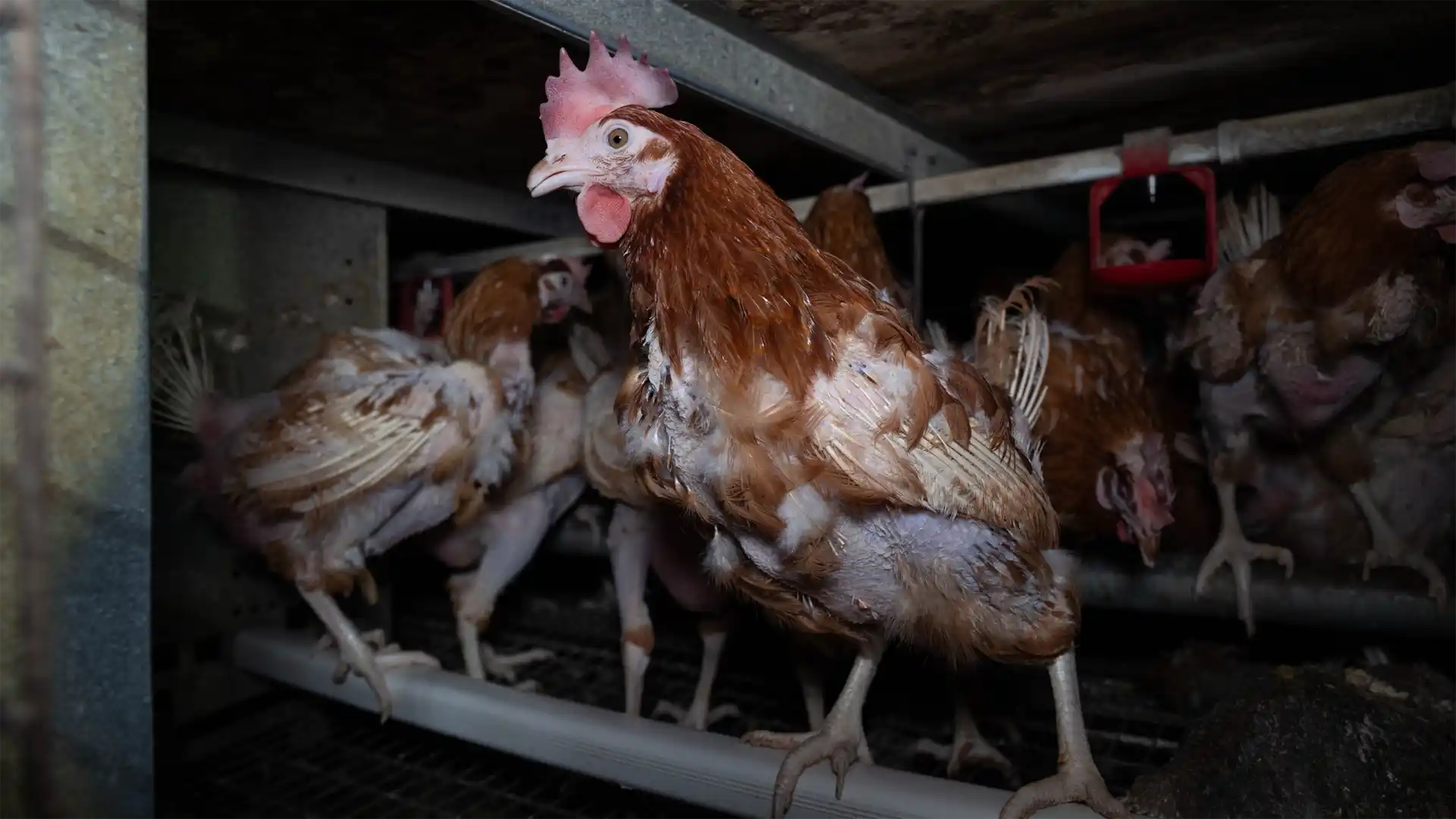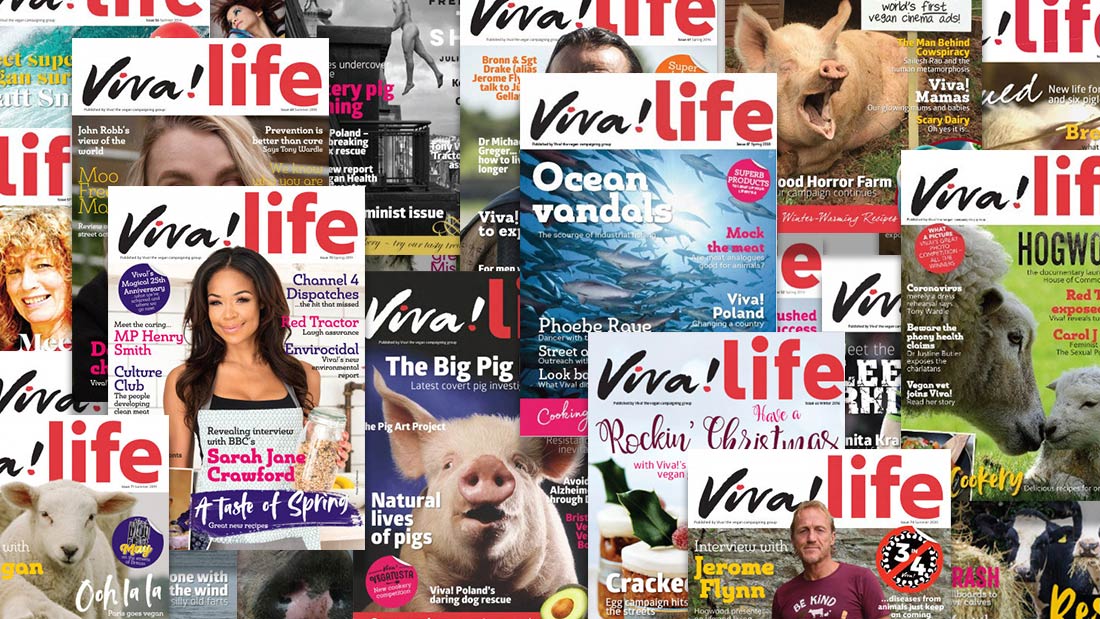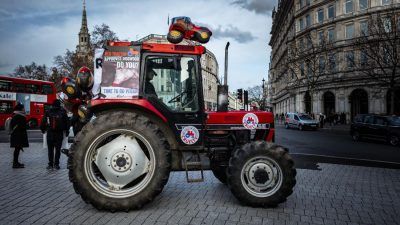The Royal Society for Contradictions – Viva!life 90

The RSPCA’s remit now seems to be the prevention of cruelty to ‘some’ animals
Featured in Viva!Life 90/Winter 2024
Over the years, we’ve had our battles with the RSPCA – but never over the extraordinary work they do in investigating reports of neglect and rescuing animals when they need it the most. But even here there’s a glaring contradiction and it leaps up and down, waving at you in the title itself – Royal Society Patronage from the late queen and others of the royal ilk contrasts starkly with their predilection for shooting and hunting wild animals with dogs. Charles and Camilla were particularly fond of hunting stags who, before the hunting ban, could be chased for hours until collapsing from exhaustion.
Despite this gaping hole in their mission statement to end cruelty, launch of the RSPCA’s Freedom Food in 1994 was, if anything, an even greater contradiction. It was going to award some farms the right to claim that their animals had been reared to high welfare standards. To most unsuspecting shoppers the name meant one thing – free range. It was nothing of the sort as meat from factory farmed and intensively reared animals could proudly carry the Freedom Food label.
There are no government laws protecting farmed animals only a long list of extremely basic recommendations. We painstakingly went through them and compared them to Freedom Food’s recommendations and for page after page they were identical. There might have been an extra drinking point here or a few centimetres more space there but much of it was a copy and paste job. Presumably there have been some improvements since then but even today, the space allowance for barn egg chickens is 15 birds per square metre. High animal welfare?
The freedom in Freedom Food was supposedly based around the five freedoms outlined in the Animal Welfare Act: freedom from hunger and thirst; to exhibit normal behaviour; freedom from pain, injury or disease; from discomfort; and from fear or distress. Pop your head around the door of any intensive farm and you can see what a nonsense this all is – a product of cynical marketing.
I put on my freelance journalist hat to meet one of the men who would inspect farms and judge if they were worthy of the Freedom Food accolade. He had previously been a pig factory farmer for 20 years! No wonder the list of members was a closely guarded secret.
Advertising continued unabated, telling consumers that all animals on Freedom Food farms had been reared to high welfare standards when we could see for ourselves it was not true. Their claims encouraged meat eating at a time when all the science was telling us that going plant-based was essential to saving the planet. Even as I’m writing this, the WWF’s Living Planet report declares that India’s food consumption pattern is the least climate damaging and most sustainable amongst all the big economies. On average, Indians eat one-twentieth the amount of meat we do.

Are you enjoying this article?
This piece was originally published in Viva!life, our exclusive quarterly magazine for Viva! members. Viva!life features editorials on our latest campaigns and investigations, exclusive celebrity interviews, ethical businesses, health news, plant-based cookery, and vegan trends.
By joining Viva! for as little as £1.50 a month, you will get Viva!life magazine delivered straight to your door four times a year, so you can be the first to read our new features — as well as lots of other great benefits!
Having exposed shocking conditions on some Freedom Food pig farms simply by luck, we complained to the Advertising Standard’s Authority (ASA) stating that Freedom Food’s claims met none of the ASA’s demands that advertising must be honest, truthful and accurate. Game set and match you might think – but we lost. And we lost because the ASA accepted the RSPCA’s claim that the five freedoms weren’t claims at all but merely aspirations. On that basis I could advertise a cure for baldness, cancer and erectile dysfunction and when it didn’t work, simply claim it was aspirational.
Viva! exposed the shocking conditions in supposedly Assured free range and ‘barn’ egg production and we wrote detailed letters and attached scientific references to every RSPCA Council member, politely outlining the abysmal failures of their scheme and its inherent hypocrisy. They didn’t reply but we know they referred to Viva! as “that four-letter word” and they did come after us (but that’s another story). However, we felt certain that the RSPCA would eventually buckle under the constant exposures of cruelty on their Assured farms and drop the scheme.
They did the opposite and in 2015 hugged the whole concept ever closer to their chest by renaming it RSPCA Assured so no one could be in any doubt about who owned it. It was a calculated two fingers up to their many critics – and the state of the world. Their encouragement to people to eat meat blatantly ignores the devastation of the world’s wildlife, for which livestock for meat and dairy are the major cause as wildernesses are stripped bare and burned to provide land for grazing and fodder growing. Whether it will admit it or not, the RSPCA contributes to this collapse in the global environment and death of wildlife.
A half-grown pig was recently rescued from one of 45 hell hole RSPCA Assured farms exposed by Animal Rising. She has been named Charlie and is now at the centre of new campaign called For Charlie, which aims to persuade the RSPCA to finally drop their appalling Assured scheme. The campaign is backed by 60 animal rights groups, including Viva! and has garnered enormous publicity. You know the kind of conditions Charlie had to endure as you’ve seen very similar scenes at many of our pig farm exposés, including the sickening Flat House Farm (now closed) and Hogwood Farm (the subject of our Netflix documentary, HOGWOOD – a
modern horror story).
The campaign has led to the resignation of Brian May as the RSPCA’s vice-president, who accuses the charity of appallingly bad standards of animal welfare and says it has sacrificed its integrity. The RSPCA’s president, Chris Packham, has also threatened to resign and has demanded that the Assurance scheme be suspended. He has expressed particular disgust at the multiple failures of the Scottish salmon industry, 70 per cent of which carries the RSPCA’s Assured label. It’s something we know a bit about having conducted covert investigations there fairly recently.
Everything about salmon farming is wrong. Taking majestic, mysterious, migratory Atlantic salmon and cramming them into pens in their thousands is a welfare insult of enormous proportions but the RSPCA has bought into it. Ignoring the environmental disaster on the seabed of Scottish lochs from excess food pellets, chemicals, antibiotics and pesticides is unacceptable. Attempting to diminish the impact sea lice infestations can have is unacceptable, particularly when they eat salmon alive and can wipe out entire farms. Ignoring the transfer of these parasites to wild salmon is also unacceptable. And when combined with the mass escape of farmed salmon who breed with wild salmon and weaken their gene pool, salmon farming has taken the Atlantic salmon close to extinction.
But there is possibly an even worse scenario that the RSPCA is directly encouraging and constantly ignores and that is the mass slaughter of wild fish to provide salmon feed. It’s estimated that for every 5.5kg farmed salmon produced, 440 wild caught fish have been killed. An industry that produces about 150,000 tonnes of salmon a year, that translates into the slaughter of 27 million wild-caught fish every year. How on Earth do you defend all this as an organisation that was set up to protect animals? This is what they tell the public:
“When you see the RSPCA Assured label on fish packaging you know the farms, and every stage of the animals’ lives, have been assessed to RSPCA’s animal welfare standards.”
Corporate speak! Bland, deceptive, self-deluding, irresponsible, phoney, corporate speak. RSPCA – the world and all its creatures are in crisis and you are part of the problem. If you really care about animals, drop your ludicrous assurance scheme and start to become part of the solution!

Did you enjoy this article?
This piece was originally published in Viva!life, our exclusive quarterly magazine for Viva! members. Viva!life features editorials on our latest campaigns and investigations, exclusive celebrity interviews, ethical businesses, health news, plant-based cookery, and vegan trends.
By joining Viva! for as little as £1.50 a month, you will get Viva!life magazine delivered straight to your door four times a year, so you can be the first to read our new features — as well as lots of other great benefits!






